Gain a deeper understanding of Obed Edom's mysterious prosperity after hosting the Ark of the Covenant, and what it reveals about divine favor.
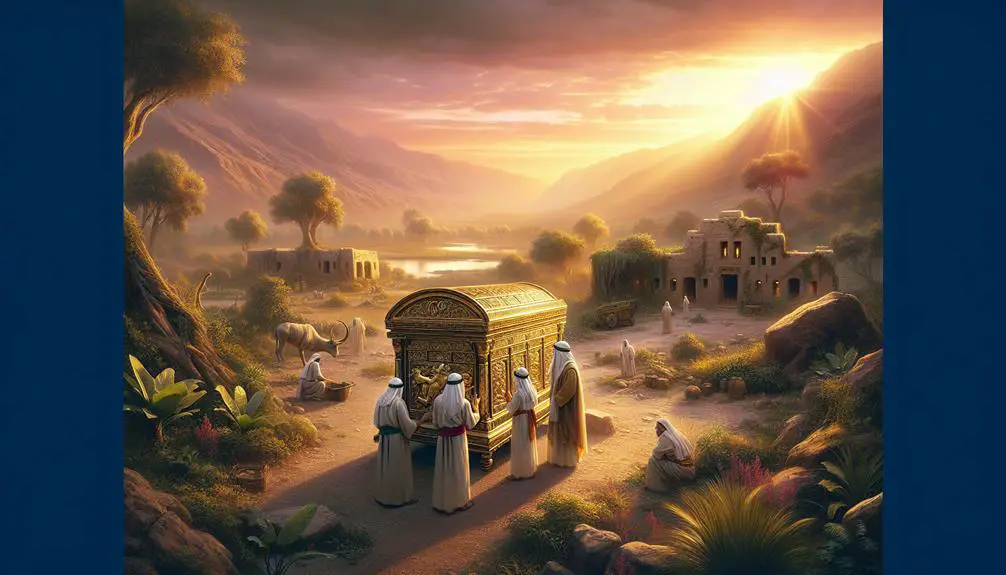
Obed Edom in the Bible
Have you ever wondered if Obed Edom's decision to host the Ark of the Covenant in his home was purely out of reverence, or if there were other, perhaps more pragmatic reasons?
This figure from the Bible has sparked curiosity among scholars and believers alike for his seemingly sudden prosperity after taking the ark in. Hosting the divine presence, Obed Edom's household was blessed, but was it his faithfulness or something else that attracted such favor?
Unraveling the layers behind this story may offer insights not only into his character but also into the broader themes of faith, obedience, and blessing.
What was it about Obed Edom that set him apart, and how might his example resonate with us today?
Key Takeaways
- Obed Edom's house was blessed with prosperity and favor due to hosting the Ark, highlighting divine presence and blessings.
- His elevated social status and generational impact underscore the lasting effects of faithfulness and divine favor.
- The story emphasizes the importance of reverence, obedience, and spiritual readiness in experiencing God's blessings.
- Obed Edom's legacy of devotion showcases the deep spiritual heritage and communal impact of aligning with divine command.
The Ark's Journey
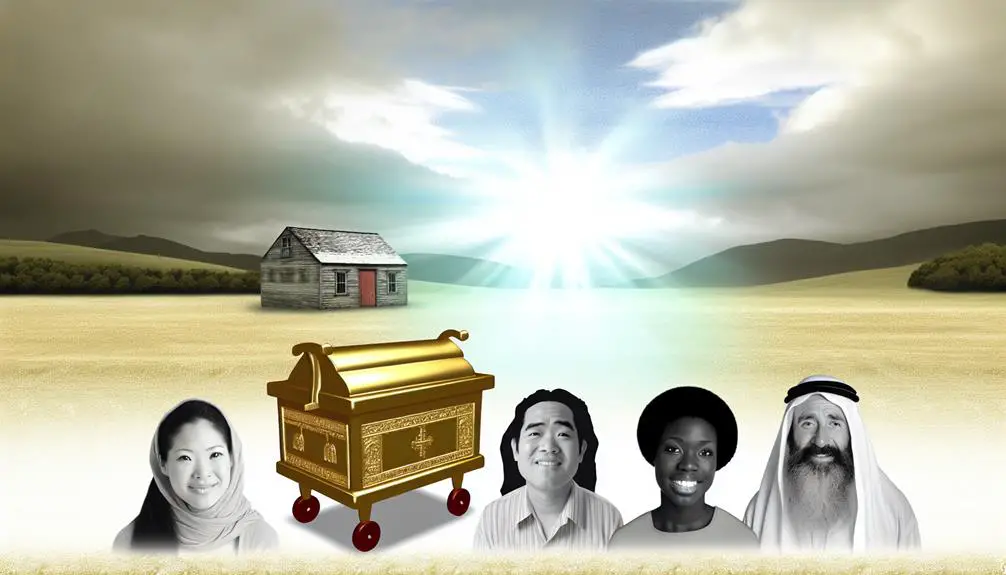
In analyzing the Ark's journey, it becomes evident that its relocation, often prompted by divine command or necessity, played a pivotal role in shaping the spiritual and communal dynamics of ancient Israel. The Ark's construction, under divine specifications, symbolized God's presence among His people, serving not only as a religious icon but also as a testament to Israel's covenant with God. Its centrality in worship and national identity underscored the significance of its movements and placements throughout history.
The episode of the Philistine capture of the Ark represents a critical juncture in its journey, highlighting the consequences of Israel's departure from divine mandates. This event illustrated the Ark's power and the peril of its misuse or disrespect. The Philistines' eventual decision to return the Ark, after experiencing devastating plagues, underscores the Ark's significance as a vessel of divine power and judgment. Moreover, this incident served as a reminder to Israel of the necessity of reverence and obedience to God's commands concerning the Ark.
Through these pivotal moments, the Ark's journey profoundly influenced Israel's religious practices, societal structure, and understanding of divine authority.
Encounter With Obed Edom
You must consider the significance of Obed Edom's encounter with the Ark of the Covenant, which marks a pivotal narrative in biblical history.
This episode not only highlights the Ark's stay in Obed Edom's house but also underscores his subsequent blessing, reflecting divine favor and the sacred nature of the Ark.
Analyzing this event provides insight into the broader themes of obedience, blessing, and the presence of God within the biblical text.
Obed Edom's Blessing
Understanding the encounter with Obed Edom reveals the profound impact of his blessing upon receiving the Ark of the Covenant into his home. This blessing wasn't just a fleeting moment of good fortune; it encompassed:
- Generational impact: Obed Edom's family experienced prosperity that extended beyond his immediate surroundings, hinting at a lasting divine favor.
- Divine favor: This wasn't mere luck; it was a clear manifestation of God's pleasure with Obed Edom's reverence and hospitality.
- Increased wealth: Reports suggest his household flourished economically, a tangible sign of his blessing.
- Elevated status: His standing within his community likely saw a significant boost, attributed directly to his association with the Ark.
This analysis underscores the multifaceted nature of Obed Edom's blessing, highlighting its spiritual and temporal dimensions.
Ark's Stay Explained
Having explored the multifaceted blessing of Obed Edom, it's crucial to examine the circumstances surrounding the Ark of the Covenant's stay in his household. This period illuminates the Covenant's significance, highlighting its role as a tangible representation of divine presence and favor.
The Ark's sojourn with Obed Edom, a figure possibly from Edom's lineage, underscores the inclusivity of divine blessings, extending beyond the immediate Israelite community. The narrative suggests that righteousness and reverence towards the divine transcend ethnic and cultural boundaries.
Analyzing this episode sheds light on how interactions with sacred objects were perceived as direct encounters with the divine, capable of bestowing prosperity and protection. This account serves as a testament to the broader theological implications of the Covenant within the biblical tradition.
Hosting the Divine Presence
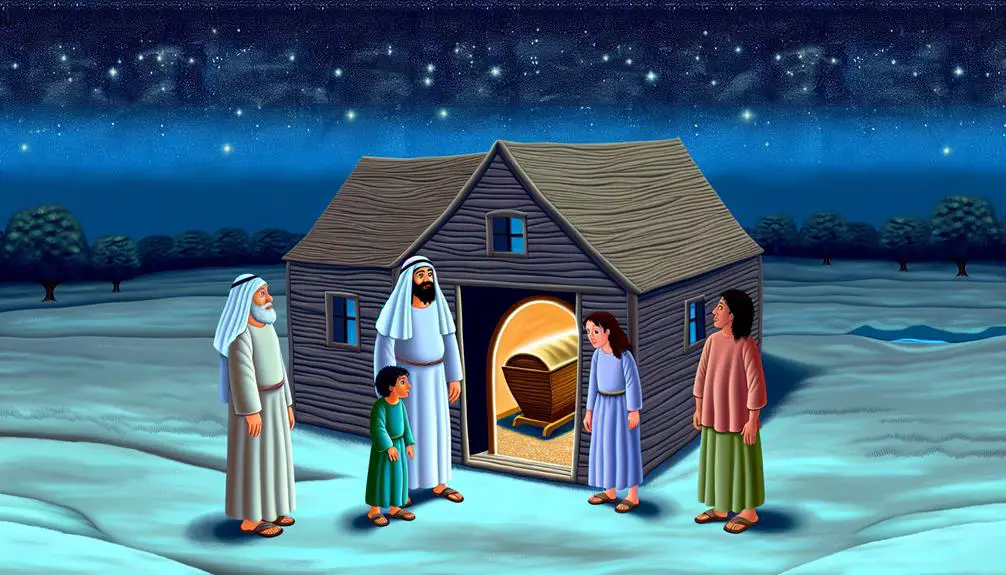
In the biblical narrative, Obed Edom's experience exemplifies the profound implications of hosting the Divine Presence within one's home. This act of divine hospitality wasn't merely a gesture of welcoming but represented a sacred trust. It involved a direct interaction with the holy, underscoring the gravity and privilege of such an invitation.
Let's delve into the components that frame this unique form of hospitality:
- Acknowledgment of the Sacred: Recognizing the presence as more than a mere guest, but as a divine entity, entails a profound respect and reverence.
- Preparation and Purity: Ensuring the environment is clean and conducive for the divine presence. This isn't just physical cleanliness but also spiritual readiness and purity of heart.
- Obedience and Humility: Hosting the divine presence requires adherence to divine commands and a humble attitude, recognizing one's place before the divine.
- Reverence and Worship: The presence of the divine turns the home into a place of worship, where acts of reverence aren't just encouraged but become a part of the daily routine.
Hosting the Divine Presence, as shown through Obed Edom's experience, is a multifaceted act that goes beyond ordinary hospitality, embodying divine hospitality and a sacred trust.
Blessings on Obed Edom's House
Obed Edom's household experienced unparalleled prosperity and blessings as a direct consequence of hosting the Ark of the Covenant. This event not only marked a pivotal moment in his life but also set a precedent for the concept of hospitality rewarded. The scriptures detail how, for three months, the presence of the Ark within his home brought about a significant transformation, underscoring the tangible benefits of reverence and open-heartedness towards the divine.
Analyzing this narrative, it's clear that the blessings bestowed upon Obed Edom's house weren't merely immediate or material. Instead, they hinted at a deeper, more enduring form of generational prosperity. The prosperity transcended financial wealth, encompassing health, familial harmony, and an elevated status within his community. This shift underscores a fundamental biblical principle: that acts of faith and devotion yield rewards beyond the temporal, impacting successive generations.
The story of Obed Edom thus serves as a compelling example of how divine favor can manifest in response to genuine acts of welcome and worship. It's a testament to the power of faithfulness and the enduring nature of divine blessings, offering a profound lesson on the ripple effects of our actions across generations.
The Impact of Faithfulness

You'll observe that Obed Edom's faithfulness not only garnered divine blessings but also established a legacy of devotion.
This faithfulness, marked by his stewardship of the Ark, illustrates a direct correlation between dedication to divine commands and the receipt of blessings.
Consequently, his example sets a precedent for the impact of unwavering devotion on an individual's legacy and divine favor.
Divine Blessings Received
The narrative of Obed Edom vividly illustrates how steadfast faithfulness ushers in divine blessings, reshaping his life and that of his household. This transformation manifests through several key aspects:
- Spiritual Growth: Obed Edom's unwavering devotion leads to a profound deepening of his spiritual understanding and relationship with the divine.
- Providential Care: The care bestowed upon him and his family is a testament to the tangible benefits of living a life aligned with faith.
- Material Prosperity: Beyond spiritual riches, there's a clear overflow of material blessings, indicating a holistic approach to divine favor.
- Community Esteem: His faithfulness elevates his status within his community, showcasing the social impact of his divine favor.
Analyzing Obed Edom's story, one observes a direct correlation between his faithfulness and the multifaceted blessings received, underscoring a universal principle of reciprocity in spiritual commitment.
Legacy of Devotion
Faithfulness weaves a lasting legacy, shaping not only individual destinies but also those of subsequent generations through the example of Obed Edom. His story in the biblical narrative highlights how devotional practices can cement a spiritual lineage that endures beyond one's lifetime.
Obed Edom's unwavering commitment to safeguarding the Ark of the Covenant didn't just secure him immediate divine favor; it set a precedent for his descendants, who continued to serve diligently in temple roles. This narrative underscores the profound impact of steadfast faithfulness on one's heritage. It suggests that spiritual dedication isn't a solitary endeavor but a communal legacy, perpetuating a cycle of devotion and blessing within a lineage.
Through Obed Edom's example, it's evident that sincere devotion fosters a spiritual heritage that resonates through generations.
Moving the Ark Again
Attempting to relocate the Ark of the Covenant, King David initiated a second effort, mindful of the sacred artifact's significance and the previous mishap's lessons. The Ark's construction and David's fear of mishandling it again underscored the gravity of this endeavor. This time, the process was marked by careful planning and adherence to divine instructions, reflecting a deep respect for the Ark's holiness and a keen awareness of the consequences of previous errors.
The steps taken to ensure a successful relocation included:
- Consultation with Priests: David sought guidance from religious leaders to understand the correct procedures for moving the Ark.
- Educating the People: There was a concerted effort to educate those involved in the transportation about the sanctity of the Ark and the importance of following specific rituals.
- Physical Preparations: Adequate measures were taken to physically prepare for the Ark's safe transport, including the construction of a new cart designed to carry it securely.
- Spiritual Preparedness: David emphasized the need for spiritual readiness, including purification rites for those directly involved in moving the Ark.
This analytical revisit of the Ark's relocation highlights the evolution of David's approach, blending reverence with meticulous planning to rectify past mistakes.
Obed Edom's New Role
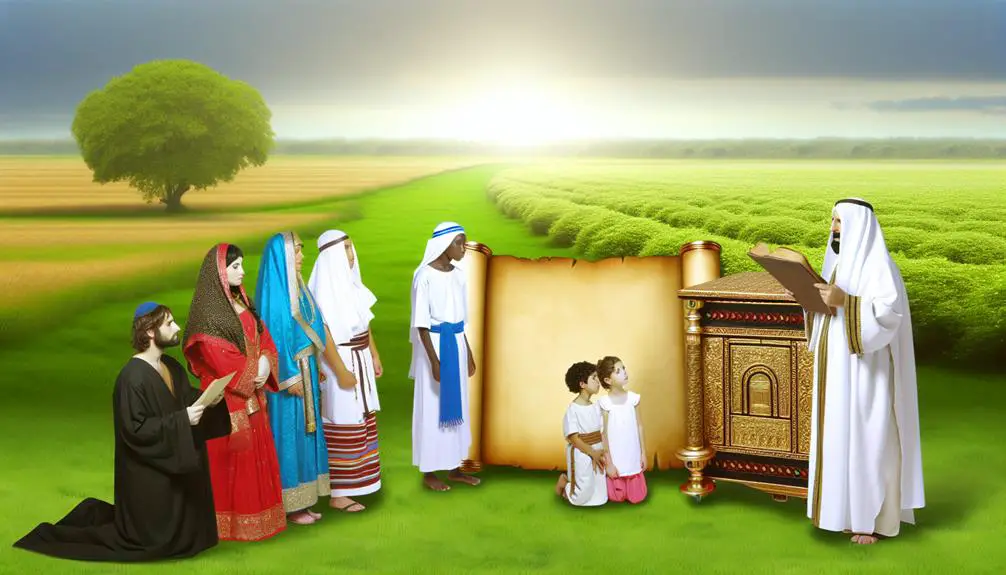
In an intriguing turn of events, Obed Edom's stewardship of the Ark of the Covenant significantly elevated his status, ushering him into a new and critical role within King David's realm. His careful guardianship of the Ark not only showcased his devoutness but also his capability to manage one of the most sacred artifacts in Israelite culture. This pivotal role highlighted his trustworthiness and spiritual integrity, elements highly valued in the historical context of the time.
Your understanding of Obed Edom's new role must consider the broader implications of his lineage. Edom's lineage, deeply rooted in the Gittite community, reflects a fascinating integration of foreign elements within the Israelite religious and social framework. This aspect of his identity adds layers to his appointment, suggesting a move towards inclusivity and recognition of merit over mere ethnic origin in David's administration.
Analyzing this shift provides insights into the evolving dynamics of power, religion, and social structure within ancient Israel. It underscores the importance of individual contributions to national history and highlights how pivotal roles were often filled by those who demonstrated exceptional loyalty and service, regardless of their background. This transition for Obed Edom is emblematic of the broader historical context, marking a period of significant transformation within King David's reign.
His Family's Legacy
Obed Edom's legacy, deeply interwoven with his stewardship of the Ark, significantly influenced his family's destiny, shaping their roles within the societal and religious fabric of ancient Israel. His story's genealogical significance and cultural implications are profound, marking his lineage with distinction and honor.
- Genealogical Significance: Obed Edom's descendants were notably blessed, as evidenced by their prominent positions in temple services. Their lineage was meticulously recorded, highlighting the import of heritage and divine favor in ancient Israelite society.
- Cultural Implications: The family's enduring legacy underscored the value of faithfulness and obedience to God's commands. Their story served as a cultural touchstone, reinforcing communal values and the interconnectedness of personal piety and communal well-being.
- Leadership Roles: Obed Edom's descendants assumed significant leadership roles, particularly in the realm of worship and music within the temple, showcasing the lasting impact of their ancestor's faithfulness on their vocational paths.
- Expansion of Clan: The growth and prosperity of Obed Edom's family, as they integrated into the broader fabric of Israelite society, underscore the broader theme of divine reward for faithfulness and the lasting impact of individual actions on familial legacies.
Lessons From Obed Edom's Story
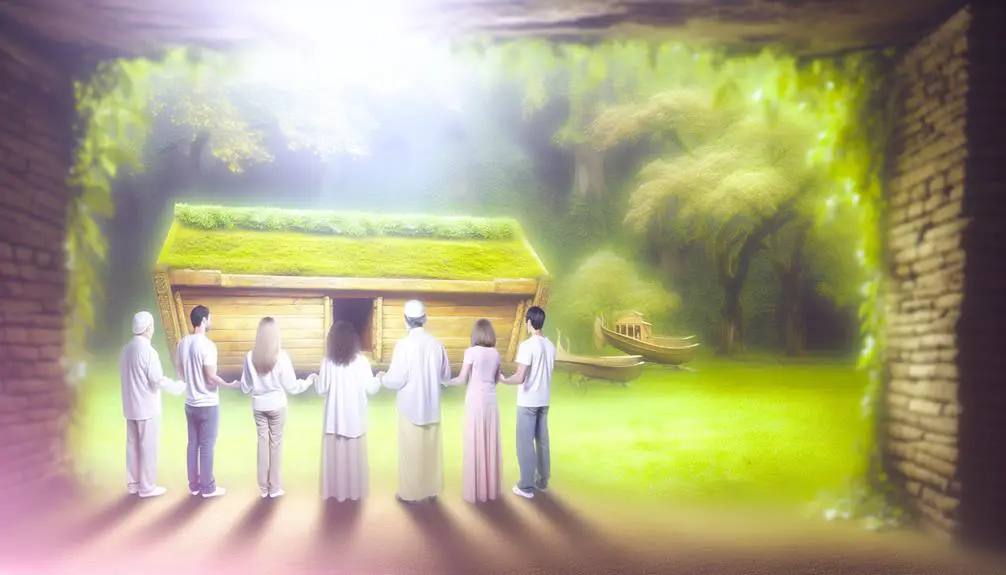
Several key lessons emerge from the story of Obed Edom, demonstrating how faithfulness and devotion can profoundly influence one's destiny and community. His role as an unexpected guardian of the Ark of the Covenant shows that great responsibility often comes unexpectedly, but embracing it with grace can lead to divine blessings. Obed Edom's gracious hospitality towards the Ark, despite the potential risks, highlights the power of reverence and respect for the divine.
Lesson |
Description |
Impact |
|---|---|---|
Faithfulness |
Obed Edom's unwavering faith in God's presence |
Brought blessings to his household |
Devotion |
His dedication to safeguarding the Ark |
Demonstrated the importance of spiritual duties |
Gracious Hospitality |
Welcoming the Ark into his home |
Showed the value of reverence and respect |
Courage |
Accepting the role of an unexpected guardian |
Illustrated how bravery can lead to divine favor |
Community Influence |
His blessings overflowed to his community |
Emphasized the communal benefits of individual faithfulness |
These elements from Obed Edom's story serve as a reminder that faithfulness, devotion, and hospitality can significantly impact both individual lives and the broader community, underscoring the intertwined nature of personal beliefs and communal welfare.
Frequently Asked Questions
How Does Obed Edom's Cultural Background and Ethnicity Play a Role in His Biblical Story?
You're exploring how cultural background and ethnicity influence a narrative, focusing on Gath's significance and Edomite lineage.
Gath, a Philistine city, hints at a rich, complex heritage intertwined with Israel's history.
Being of Edomite descent, the character's story likely reflects broader themes of integration and the shifting dynamics between neighboring peoples.
This analysis uncovers layers of meaning, showing how identity and cultural roots shape interactions and perceptions within a historical and biblical context.
Are There Any Archaeological Findings or Historical Evidence That Validate the Existence of Obed Edom or His Household?
You're diving into the past, sifting through the sands of time with archaeological methods at your fingertips.
But when it comes to unearthing evidence of Obed Edom or his household, the trail runs cold. Despite the absence of cultural artifacts directly linked to him, the quest isn't fruitless.
It's a reminder that not all historical figures leave behind tangible proof, challenging you to look beyond the physical for validation.
How Has Obed Edom Been Portrayed or Referenced in Various Religious Traditions Outside of Mainstream Christianity and Judaism?
You'll find Obed Edom's portrayal in Islamic perspectives and cultural interpretations varies widely outside mainstream Christianity and Judaism. Islamic texts don't typically highlight him, focusing more on prophets and key figures directly linked to Islamic teachings.
Meanwhile, cultural interpretations might weave his story into broader narratives, reflecting local beliefs and values. These views offer a rich tapestry of understanding, showcasing how religious figures can transcend their original contexts through diverse global lenses.
What Are the Ethical and Moral Debates Surrounding the Concept of Divine Blessings and Punishments as Illustrated in Obed Edom's Story?
Diving into the tempest of ethical debates, you'll find that divine justice and moral autonomy stand at the heart of discussions on divine blessings and punishments.
This notion challenges you to consider whether humans are merely pawns subject to divine will or if they possess the freedom to influence their fate.
Analyzing these concepts reveals a complex interplay between divine decrees and human agency, urging a deeper reflection on the nature of morality and justice.
How Do Modern Theologians and Scholars Interpret the Silence or Absence of Obed Edom in Key Biblical Narratives Following His Initial Introduction?
When you explore the narrative gaps surrounding certain figures, it's essential to consider their genealogical significance.
Modern theologians and scholars often interpret these silences as not mere oversights but as intentional, inviting deeper analysis. They suggest these absences might underscore thematic or theological points, encouraging a reevaluation of the individual's role and impact.
This approach opens up new avenues for understanding the broader narrative and its underlying messages.
Conclusion
In your journey through life, consider Obed Edom's story as a lighthouse guiding ships through treacherous waters. Hosting the Ark, he experienced unprecedented blessings, a testament to the rewards of faithfulness and hospitality towards the divine.
His legacy, flourishing with descendants serving in the temple, illustrates that embracing one's role in the divine narrative can lead to profound impacts across generations. Thus, Obed Edom's life serves as a compelling metaphor for the transformative power of faith and devotion in cultivating a legacy of blessing.



Sign up